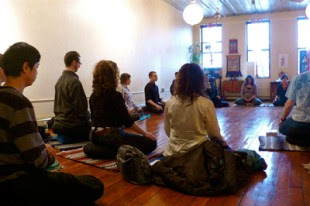
Buddhism and Rebirth
Why does Buddhism call it rebirth instead of "reincarnation"? Surely these are synonyms, that is, two words that mean the exact same thing.
Incarnation means "into flesh" (carne). Re means "again." So what "reincarnation" implies is that a permanent soul or a constant self is traveling from life to life, taking up bodies on various planes of existence.
 This is exactly what the Buddha taught does NOT happen -- in an ultimate sense. This is, however, what APPEARS to happen in a conventional sense. Conventionally speaking, as we use words in normal everyday language, we can say: "I will be reborn." We never question this "I." We take it for granted that it is some permanent, pleasing, personal thing.
This is exactly what the Buddha taught does NOT happen -- in an ultimate sense. This is, however, what APPEARS to happen in a conventional sense. Conventionally speaking, as we use words in normal everyday language, we can say: "I will be reborn." We never question this "I." We take it for granted that it is some permanent, pleasing, personal thing.
If we did question it and investigate it (with a mind purified by right concentration and mindfulness) we would soon realize that the "self" we cling to for an entire lifetime is actually falling away every single moment. It is not the same for two consecutive moments. It does not stand even for a single moment. (It is in this sense that the Buddha speaks of radical impermanence).
Just as its factors (because the "self" is a composite not a unit) arise, they are already turning then falling. A leaf sprouts, yellows, and drops. Even as it is going from green to yellow, it is ripening to brown in an unbroken process. This is impermanence.
We are born, immediately begin aging, and fall away -- and this obvious process hides a very unobvious fact: The same thing is happening every single moment. We will not die; we are already dying. Every moment is a rebirth, a rearising.
 And successively in that same moment, there is a turning and a falling away. We are always being reborn. And just as above (in an ultimate sense at the level of particle physics as understood by quantum mechanics) so below (in a conventional or Newtonian sense at the level of everyday visible objects).
And successively in that same moment, there is a turning and a falling away. We are always being reborn. And just as above (in an ultimate sense at the level of particle physics as understood by quantum mechanics) so below (in a conventional or Newtonian sense at the level of everyday visible objects).
- Physically (bodily) the Four Great Elements (Mahabhuta, dhatus, or material qualities of solidity, cohesion, temperature, support) are constituents that rise and fall in a way that only physicists can normally appreciate.
- Psychologically (mentally) the four constituents of mind (or mental activities of sensation, perception, volition [etc.], and consciousness) rise even more quickly in a way that only successful meditators can normally appreciate.
But if one is to ever achieve enlightenment (bodhi), touch nirvana, and be liberated from all suffering, one must have insight (vipassana) into why this is not what was ever happening.
There was never a "self" continuously wandering on through the Wheel of Life and Death (samsara).
We, of course, cling to our notion of an ego or a ME without seeing the truth. But it is only the truth that can set one free. What is the truth?
There are Five (ever-changing) Aggregates. They are unsatisfactory and impersonal. They arise and pass away. All claims of a self, whether in one life or across countless lives, are spoken of in relation to these five:
- forms (subtle or gross bodies)
- feelings
- perceptions
- formations
- consciousness
We imagine ourselves as them, apart from them, as the owner of them, and so on. We take them for granted instead of investigating them and seeing them for what each really is.

Insight means seeing (with knowledge-and-vision) directly. This is an experience not a thought experiment. It is brought about by insight practices establishing the Four Foundations of Mindfulness, which are 14 meditative exercises guaranteed to lead to enlightenment.
- "Guaranteed"? In a remarkable statement, the Buddha concludes the Maha Satipatthana Sutra with the words: "Truly speaking, practitioners, for anyone who practices these four foundations of mindfulness in this manner for seven years then one of these two fruits may be expected: highest knowledge (full liberation) here and now or, if some remainder of clinging is yet present, the state of non-returning (the third of four stages of enlightenment). O practitioners, let alone seven years! Should any person practice these [unbroken and without intermission] for six years... five years... four years... three years... two years... one year... seven months... six months... five months... four months... three months... two months... a month... half a month... let alone half a month! Should any person practice these four foundations of mindfulness in this manner for a week then one of these two fruits may be expected: highest knowledge here and now or, if some remainder of clinging is yet present, the state of non-returning." Because of this it was said: "This is the direct way, practitioners, for the purification of beings, for the overcoming of sorrow and lamentation, for the destruction of suffering and grief, for reaching the right path, for the attainment of nirvana, namely the four foundations of mindfulness."
How to reach enlightenment How is it done? One first develops serenity to the point of absorption (jhana) or access-concentration. Based on that secure and stable platform, which brings out what the mind is really capable of, one then takes up each of these four "foundations" to break through to freedom from all suffering.
How is it done? One first develops serenity to the point of absorption (jhana) or access-concentration. Based on that secure and stable platform, which brings out what the mind is really capable of, one then takes up each of these four "foundations" to break through to freedom from all suffering.
- mindful contemplation of body
- mindful contemplation of feelings
- mindful contemplation of consciousness
- mindful contemplation of mind objects
How long does it take? It takes a week, but it may take seven years or more. It all depends on consistent practice and karma (action).


































































































































































































































No comments:
Post a Comment